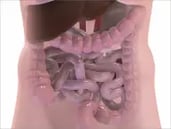Constipation is one of the most frequent gastrointestinal complaints in the USA.
Not only does this result in a least 2.5 million doctor visits,but hundreds of millions of dollars are spent on laxatives each year!
So what is constipation? A bowel habit can be about consistency, frequency and about quality of an evacuation. Stools should not be too hard or soft and having a movement daily or every other day would be considered normal. One should not have to have more than 1-2 movement in a day.
But what causes it? Factors include dehydration, a change in diet and inactivity or certain medications that we may be taking. Some of these medications include narcotic pains pill and drugs used for high blood pressure and other cardiac conditions.

So, you have now been constipated for weeks. Certainly look at your fluid and fiber intake, but if you think that you have had a real change in your bowel habits, talk to your doctor.
Personal and family history are important to know. Having a first degree relative with colorectal cancer is very relevant and is a strong consideration when evaluating a patient with a change in bowel habits. A simple stool test looking for hidden or occult blood may be appropriate, and, if positive, may warrant a camera inspection of the colon known as colonoscopy. There are situations where colonoscopy should be performed more expeditiously. Certainly, if there is rectal bleeding, some evaluation should take place. Assuming that rectal bleeding is attributable to hemorrhoids is very risky as cancers can be present in this manner.
If you haven’t experienced constipation in a while or even ever, the following are some simple steps on prevention. Adequate fluid intake with 6-8 glasses of water daily and consuming up to 40 grams of soluble fiber is a good start. What about laxatives? They should be used sparing and stimulants of the gastrointestinal tract should be avoided.There are a variety of agents and should be discussed with your health care professional.
One last point, even if you have no colon complaints, colonoscopy for colon cancer prevention should be offered to all average risk patients at age 50 and earlier if there is a family history of colon cancer or polyps. African Americans undergo screening at age 45.
For more information, please visit the American Cancer Society at:
http://www.cancer.org/cancer/colonandrectumcancer/moreinformation/colonandrectumcancerearlydetection/colorectal-cancer-early-detection-acs-recommendations

.webp?width=193&height=129&name=file-889257609%20(1).webp)


